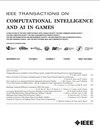基于游戏训练的数据驱动场景生成框架的设计与评估
Q2 Computer Science
IEEE Transactions on Computational Intelligence and AI in Games
Pub Date : 2017-09-01
DOI:10.1109/TCIAIG.2016.2541168
引用次数: 20
摘要
生成适合个人玩家的游戏场景已成为程序内容生成中的一个新兴挑战。在本文中,我们提出了一个用于基于游戏的训练的数据驱动场景生成框架。采用体能评估方法设计了一个进化场景生成过程,该方法集成了基于人工神经网络的人工智能玩家建模、模拟和模型训练过程。基于所提出的方法,可以自动构建场景评估的适应度函数。为了进一步加强对场景的评估,我们专门研究了场景中事件发生时间的影响,并提出了一个通用的场景表示模型,该模型基于场景中事件的类型和时间来表征单个场景。我们通过验证我们的人工智能玩家模型,展示场景中事件发生时间的影响,并将我们的数据驱动框架的有效性与我们以前基于启发式的方法和随机基线进行比较,对我们的框架进行了广泛的评估。结果表明,在场景评估中有必要考虑事件的时间安排,并且所提出的框架在生成基于游戏的训练场景方面效果良好。本文章由计算机程序翻译,如有差异,请以英文原文为准。
Design and Evaluation of a Data-Driven Scenario Generation Framework for Game-Based Training
Generating suitable game scenarios that can cater for individual players has become an emerging challenge in procedural content generation. In this paper, we propose a data-driven scenario generation framework for game-based training. An evolutionary scenario generation process is designed with a fitness evaluation methodology that integrates the processes of AI player modeling, simulation and model training based on artificial neural networks. The fitness function for scenario evaluation can be automatically constructed based on the proposed methodology. To further enhance the evaluation of scenarios, we specifically study the impact of the timing of events in a scenario and propose a generic scenario representation model that characterizes individual scenario based on the types and timing of events in the scenario. We present an extensive evaluation of our framework by validating our AI player model, demonstrating the impact of timing of events in a scenario and comparing the effectiveness of our data-driven framework with our previous heuristic-based approach and a random baseline. The results show that it is necessary to consider the timing of events for scenario evaluation and the proposed framework works well in generating scenarios for game-based training.
求助全文
通过发布文献求助,成功后即可免费获取论文全文。
去求助
来源期刊

IEEE Transactions on Computational Intelligence and AI in Games
COMPUTER SCIENCE, ARTIFICIAL INTELLIGENCE-COMPUTER SCIENCE, SOFTWARE ENGINEERING
CiteScore
4.60
自引率
0.00%
发文量
0
审稿时长
>12 weeks
期刊介绍:
Cessation. The IEEE Transactions on Computational Intelligence and AI in Games (T-CIAIG) publishes archival journal quality original papers in computational intelligence and related areas in artificial intelligence applied to games, including but not limited to videogames, mathematical games, human–computer interactions in games, and games involving physical objects. Emphasis is placed on the use of these methods to improve performance in and understanding of the dynamics of games, as well as gaining insight into the properties of the methods as applied to games. It also includes using games as a platform for building intelligent embedded agents for the real world. Papers connecting games to all areas of computational intelligence and traditional AI are considered.
 求助内容:
求助内容: 应助结果提醒方式:
应助结果提醒方式:


